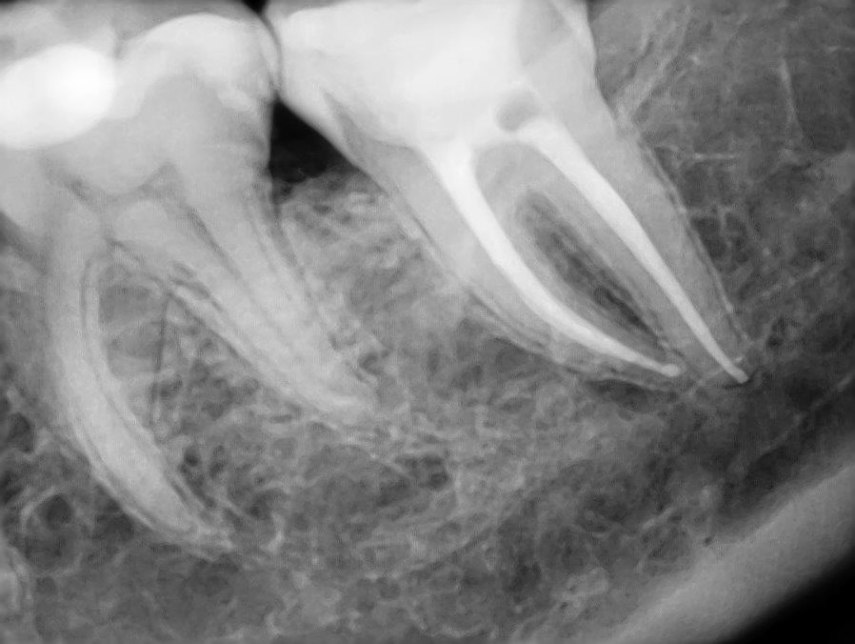Home / Dental Treatments / Endodontics
Endodontics
Are you searching for a root canal specialist in Nicosia? Smalto Dental Clinic features an experienced team of dentists specialized in endodontics who can save your teeth with a painless and expertly performed root canal treatment.
A root canal is the most suitable dental treatment for saving teeth and keeping your natural smile intact. If deep tooth decay, a damaged tooth, or a tooth infection remain untreated, you may lose your tooth.
One or more visits to a root canal specialist dentist will ensure that you keep your natural teeth for as long as possible and prevent the need for dental implants or bridges.
With the help of our expert endodontists, you can be sure that your root canal procedure will be pain-free and with minimal discomfort. If you’re experiencing any symptoms of an infected tooth, call your local dentist at Smalto and get the help you need and deserve!

Call us today and take the first step to a
healthier, more beautiful smile!

A root canal is the right dental treatment to save a tooth that would otherwise be lost. It is a simple and straightforward procedure. However, it must be done only by a dentist who has received specialized education and has extensive experience in performing root canals. These specialist dentists are called endodontists.
Endodontists use root canals to treat infected teeth that have become severely damaged or decayed. During the procedure, the specialized dentist will remove the infected or damaged pulp from the inside of the tooth, clean and disinfect the tissue area, remove any bacteria and then fill and seal it. The tooth is then capped with a dental crown to protect it and restore its appearance. This process helps ensure that infections do not spread and the tooth remains healthy.
Root canal treatment is painless, as the dentist will anaesthetize the tooth fully to ensure that the procedure runs smoothly and comfortably without the much-dreaded root canal pain.
A root canal can be completed in one or more visits to the dental clinic, depending on the extent of treatment required. Patients can expect to experience some discomfort during this minor surgery, but the benefits of a root canal far outweigh any temporary discomfort.
A root canal is necessary when there is damage deep inside a tooth. More specifically, the pulp, which is the innermost part of a tooth that contains nerves and blood vessels, may have become infected or inflamed. This can occur due to deep decay, repeated dental procedures on the tooth, a crack or chip in the tooth, or a tooth trauma.
If left untreated, an infected or inflamed pulp can lead to a painful abscess and may cause damage to the bone surrounding the tooth. In some cases, the infection can even spread to other parts of the body.
Your expert dentist and endodontist will determine if a root canal is necessary for your case by examining your tooth and taking X-rays to assess the extent of the damage. If you are experiencing tooth pain or sensitivity, it is important to see your dentist right away to determine the cause and prevent further damage to your tooth.
At Smalto Dental Clinic Nicosia, we educate our patients on the importance of immediate and effective root canal treatments to save their teeth!


Benefits of a root canal treatment:
Each patient’s case is different, so the Smalto team will create a personalized root canal treatment plan for you.
Once one of our expert dentists assesses the infected tooth, he/she will make a diagnosis and will discuss the treatment plan with you. You may need to return to the clinic for a treatment appointment that lasts one to two hours.
The root canal procedure is relatively painless, as the dentist will use a local anesthetic to numb the area. Most patients report minimal discomfort during this dentistry procedure and can return to their regular activities afterwards.
After the procedure is complete, the tooth is restored to its original strength and can perform normal activities like chewing and smiling. It is also possible to whiten the tooth after the root canal treatment, allowing it to blend in with the rest of your teeth.
If you want a dental clinic that showcases a high success level for root canal treatment, call Smalto Dental Clinic today and trust our expert dentists specialized in root canals!

After a root canal treatment, you should take proper care of the treated tooth to ensure proper healing and prevent infection. Here are a few things to avoid after a root canal treatment:
Don’t skip any follow-up appointments with your dentist, as they may need to monitor your healing progress and adjust your treatment plan if necessary
Yes, you can eat after a root canal treatment, but it’s essential to be cautious and avoid certain foods until the treated tooth has fully healed.
In the first few days after the procedure, you should stick to soft, easy-to-chew foods such as soups, yogurt, and mashed potatoes. Avoid hard, crunchy, or sticky foods that can put pressure on the treated tooth or damage any temporary filling or crown placed.
Your specialist dentist will provide specific dietary instructions based on your individual case, so be sure to follow their guidelines for the best possible outcome.
Yes, it is possible for an endodontist to miss a root during a root canal procedure. This can happen for several reasons, such as the presence of additional canals that were not visible on X-rays or during the procedure, or the root being in a difficult-to-reach area.
In some cases, the missed root may cause symptoms such as pain or infection, and a second root canal procedure may be necessary to address the issue. However, it’s important to note that endodontists are highly trained specialists who use advanced tools and techniques to locate and treat all roots during a root canal procedure, so missed roots are relatively rare occurrences.
The healing time for endodontic surgery can vary depending on the individual case and the extent of the procedure. Most patients can expect to experience some discomfort and swelling for a few days after the surgery. Full healing can take several weeks or even months.
Your endodontist will provide specific post-operative instructions to help speed up the healing process and prevent complications. This may include avoiding certain foods or activities for some time, taking prescribed pain medications or antibiotics, and following a strict oral hygiene routine.
Your endodontist will also schedule follow-up appointments to monitor your healing progress and ensure that the treated tooth is properly healing. Attending all scheduled appointments and reporting unusual symptoms or issues to your endodontist is very important.
The most common cause of root canal failure is the presence of bacteria in or around the treated tooth, which can lead to infection and inflammation. This can happen if the tooth is not properly cleaned and sealed during the initial root canal procedure, or if the sealant material breaks down over time and allows bacteria to re-enter the tooth.
Other common causes of root canal failure include:
It’s important to choose an experienced and qualified endodontist to prevent root canal failure. Call Smalto Dental Clinic in Nicosia, and our expert endodontists will happily answer all your questions.
Root canal treatment is a common dental procedure that can alleviate pain and save a damaged tooth. The cost of root canal treatment in Cyprus can vary depending on several factors, such as the complexity of the procedure, the number of canals involved, and the extent of damage to the tooth. Generally, the cost of root canal treatment can range from 200€ to 300€, which may include x-rays and the procedure itself.
However, additional costs may arise if the tooth requires a post or a crown to be restored fully. Root canal treatment preserves a natural tooth and helps patients avoid more costly dental procedures in the future, like dental implants. Talk to our experienced endodontists at Smalto Dental Clinic Nicosia to receive a personalized treatment plan that fits your needs and budget while achieving the best possible outcome for your dental health.
The most common signs of a failed root canal to watch for may include:
If you experience any of these signs, contact your endodontist as soon as possible for an evaluation and treatment. Delayed treatment can lead to further complications and potential loss of the tooth.
If a root canal treatment fails to resolve a tooth infection or other dental problem, the next steps might be a second root canal to remove any remaining infected tissue and restore the tooth.
However, if the tooth is severely damaged or infected, the endodontist may recommend extraction as the best option to prevent further damage to surrounding teeth and gums.
After tooth extraction, options for tooth replacement may include dental implants, bridges, or dentures. Your dentist or endodontist will work with you to determine the best course of action based on your individual case, preferences, and budget.
Prevention is always the best approach when it comes to dental health. Regular dental checkups, good oral hygiene, and prompt treatment of any dental issues can help prevent the need for more invasive and costly procedures down the road.